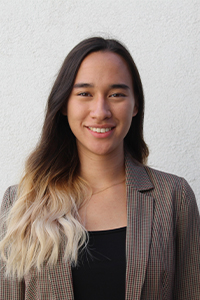She completed her primary and secondary school studies at ELTE Radnóti Miklós Practicing Primary School and Practicing High School in a 12-class system and was admitted to the Molecular Bionics Engineering Department of the Faculty of Information Technology and Bionics at Pázmány Péter Catholic University in 2021 after her successful graduation.
During her highschool years, she started working with Katalin Schlett in her research group at the Department of Physiology and Neurobiology at ELTE in the framework of a mentoring program. This is how she became acquainted with the Research Students Movement. In 2020 she participated in the XX. TUDOK competition at the Thematic Conference on Life Sciences and Environmental Sciences in the Molecular and Microbiology, Genetics section with her presentation How surface treatment and culture media affect the adhesion and development of cultivated mouse embryonal neurons? with which she won the grand prize in the section. Then she took part in the XIII. Poster competition. Thanks to her achievements at these events, she was invited and gladly participated in the National Student Conference at Káptalanfüred, where she became part of a supportive, cohesive and motivating community and where the General Assembly entrusted her with the position of president.
Her main areas of interest are the natural sciences, with an emphasis on molecular and neurobiology. She is also interested in IT, English and French. Moreover, she is curious about psychology and has participated in the Psychology Student Workshop organized by Matehetsz.
In addition to research, she enjoys spending her free time in various art fields, such as photography, poetry writing, painting, and guitar playing. She also goes hiking and since literature is also important to her, she tries to spend as much time as possible reading.
„Research is a defining experience because one gets an answer to their ’why ?’. It’s usually not a short process, but the moment the whole picture comes together and makes sense is worth everything. That is why research work also teaches patience and perseverance, in addition to showing that good academic performance does not necessarily mean success in practice. That’s why I’m grateful that the Research Students Movement supports ambitious students who are burning with the desire to discover and are full of questions. I will do my best to get as many people as possible to experience what it is like to belong to KutDiák, where we accept and help each other, because everyone here understands exactly what a pleasure it is to be part of a research.”

